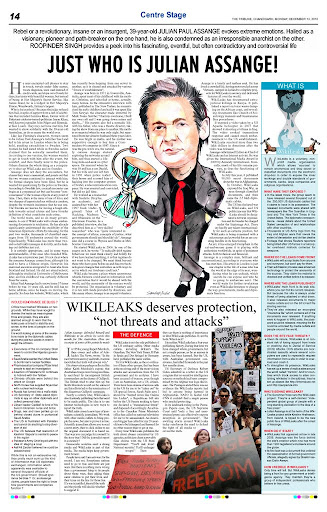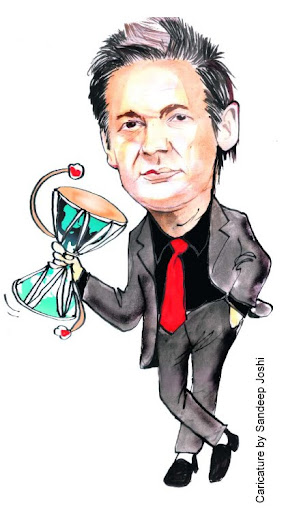Rebel or a revolutionary, insane or an insurgent, 39-year-old JULIAN PAUL ASSANGE evokes extreme emotions. Hailed as a visionary, pioneer and path-breaker on the one hand, he is also condemned as an irresponsible anarchist on the other. ROOPINDER SINGH provides a peek into his fascinating, eventful, but often contradictory and controversial life

He uses encrypted cell phones to stay in touch, travels under false names, wears disguises, uses cash instead of credit cards, and stays out of touch for days, has trysts with beautiful women, but instead of being in Her Majesty’s Secret Service, like James Bond, he is lodged in Her Majesty’s Prison, Wandworth, Britain’s largest.
Why is he in prison? Because the judge refused him bail, in spite of support from a raft of celebrities that included Jemima Khan, former wife of Pakistani cricketer-turned-politician Imran Khan, well-known journalist John Pilger and filmmaker Ken Loach. They may not have met him, but wanted to show solidarity with the 39-year-old Australian, as do so many the world over.
Like Ian Fleming’s character, women seem to be Julian Paul Assange’s Achilles’ heel and led to his arrest in London where he is being held, pending extradition to Sweden. Two women he had dated while in Sweden earlier alleged that he sexually assaulted them. According to one version, the women wanted to get in touch with him after the event, but couldn’t, and then finally went to the police. Others dismiss the whole thing as a conspiracy to shut up WikiLeaks and its founder.

Assange does not deny the encounters, but claims they were consensual, and points out that the two women continued to interact with him. No formal charges have been filed, but he is wanted for questioning by the police in Sweden. According to Swedish law, a sexual encounter can begin as a consensual act but can become “non-consensual” if the woman objects at any point of time. Then, there is the issue of use of force and two charges of unprotected sex without a condom, despite the women’s insistence that he use one. The Swedes are known for having a tough attitude towards sexual crimes and have broader definition of what constitutes such crime.
The world waits, and so do many governments, to see if WikiLeaks will release embarrassing documents in retaliation. He has already significantly undermined the credibility of the American diplomatic efforts by releasing, for the past two weeks, thousands of classified messages from US embassies around the world. Significantly, WikiLeaks has more than two-and-a-half-lakh messages in its kitty, and is leaking out dribbles just yet.
It is entirely appropriate, and in some ways understandable, if the man who founded WikiLeaks has a mysterious past. It’s not clear where the surname Assange comes from, although it is said to have a Chinese origin. However, his maternal ancestors emigrated to Australia from Scotland and Ireland. He did not attend school, although he studied at University of Melbourne later, and his childhood was certainly different from the norm,
Julian Paul Assange had to move home 37 times before he was 14 years old, and he still has no home address, since he keeps on moving frequently. So does his website, WikiLeaks, which has recently been hopping from one server to another, as it is chased and attacked by various “forces of establishment”.
Assange was born in 1971 in Townsville, Australia, spent most of his childhood with his mother, Christine, and schooled at home, actually, many homes. In the exhaustive interview with him, published in The New Yorker, he romanticised his early childhood and said it was spent like Tom Sawyer, the character made immortal by Mark Twain. Said he: “I had my own horse, I built my own raft and I was going down mines and shafts….” His parents also led a nomadic life, with his father, who was a theatre director, taking the show from one place to another. His mother re-married when he was only eight, but separated from her abusive husband three years later.
He was bright in maths, and his mother was supportive enough to buy him a Commodore 64 computer in 1987. Since it was the pre-www era, the naturally curious Assange started exploring the networks around him, and thus started a lifelong hide-and-seek in cyber space. He married when he was 18 and has a son Daniel, but his wife and son left him in 1991 when police raided their house and accused him of hacking into the computer system of Nortel, a telecommunication company. He was arrested and convicted, but did no jail time.
He worked as a researcher with Suelette Dreyfus, an academic, and assisted her with her 1997 book Underground: Tales of Hacking, Madness and Obsession on the Electronic Frontier. In a published interview, she has described him as a “very skilled researcher” who was “quite interested in the concept of ethics, concepts of justice, what governments should and shouldn’t do”. Assange also did a course in physics and maths at Melbourne University.
He started WikiLeaks in 2006. In one of the essays on it, he wrote: “To radically shift regime behaviour we must think clearly and boldly for if we have learned anything, it is that regimes do not want to be changed. We must think beyond those who have gone before us and discover technological changes that embolden us with ways to act in which our forebears could not.”
WikiLeaks became a place where anonymous whistleblowers could send in information with the conviction that it would be shared with the world, and the anonymity of the sources would be protected. The organisation is voluntary and it is run with funds provided by donations, and like many others, Asange is an unpaid volunteer.
Asange is a lonely and restless soul. He has lived a crowded life, having motorcycled across Vietnam, camped in Iceland to complete projects for WikiLeaks in secrecy and delivered lectures all over the world.
WikiLeaks has documented extra-judicial killings in Kenya. It published a report on toxic waste dumping on the African coast, and revealing documents like Church of Scientology manuals and Guantanamo Bay procedures.
It exposed a video taken by a US Apache helicopter in 2007 that showed it shooting civilians in Iraq. The video evoked tremendous response and caused much embarrassment to the US establishment. WikiLeaks received more than two lakh dollars in donations after the video was released.
Assange calls himself Editor-in-Chief of WikiLeaks and an Internet activist. He was given the International Media Award in 2009 by Amnesty International. Ironically, much of his life remains private, as does the functioning of WikiLeaks.
In July this year, it published 90,000 secret documents about the war in Afghanistan.
In October, WikiLeaks exposed the Iraq War, as seen through classified documents, and then came the 2.5 lakh diplomatic cables.
The US has declared war on WikiLeaks, and US politicians say that WikiLeaks should be designated a terrorist organisation and its founder be charged under the Espionage Act. There are hardly any takers internationally for such an extreme position, but WikiLeaks is being examined with a microscope and powerful forces are creating hurdles in its functioning.
As yet, it has emerged triumphant in the cat-and-mouse game it is playing with authorities worldwide, in spite of persistent attacks, both technical and financial.
Assange is a complex man, brilliant and unconventional, according to everyone who has met him. His arrest in London is just one chapter in the life of a man who has the world at the edge of its seat, wondering what he can unleash, which secrets he can expose and who he is going to embarrass next. The world waits for further revelations even as Wikileaks threatens to change the way governments, media and diplomats function.
The article was published in The Tribune on December 13, 2010.
